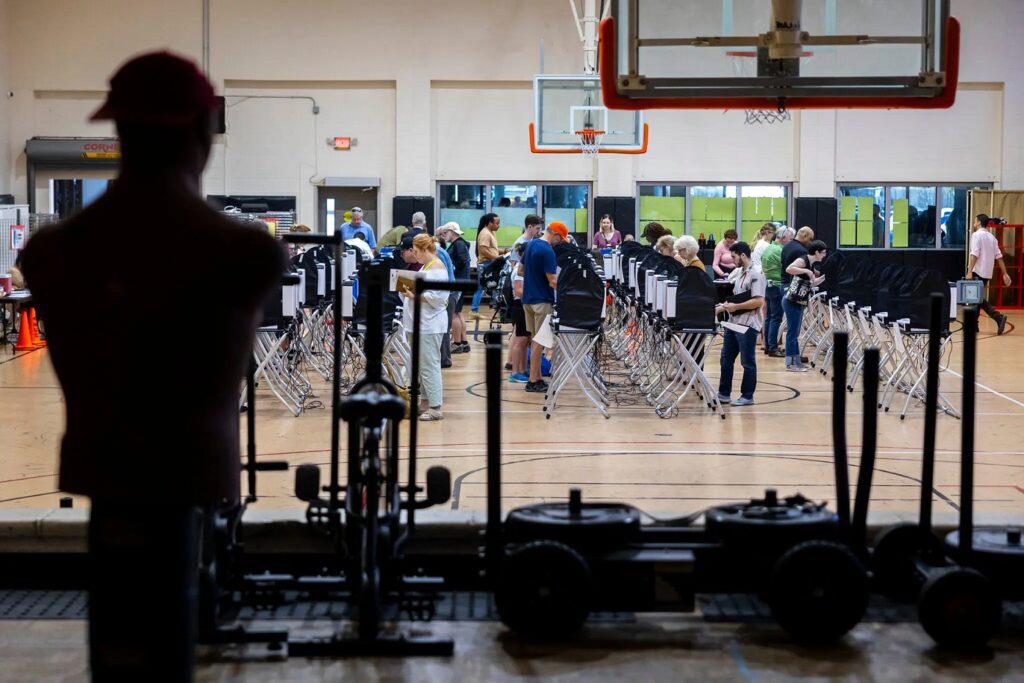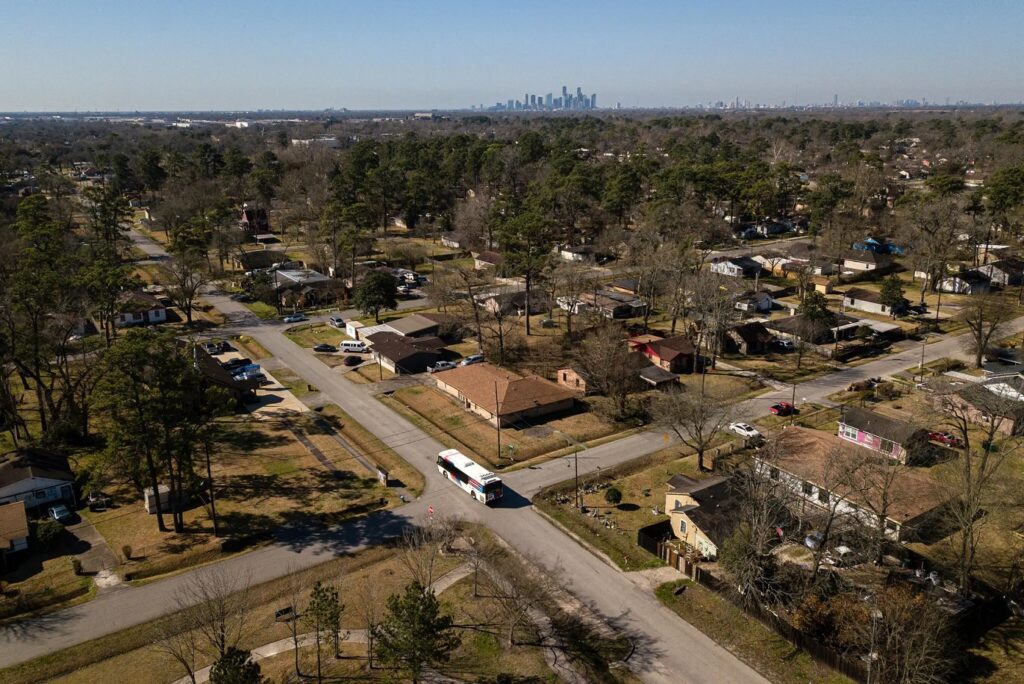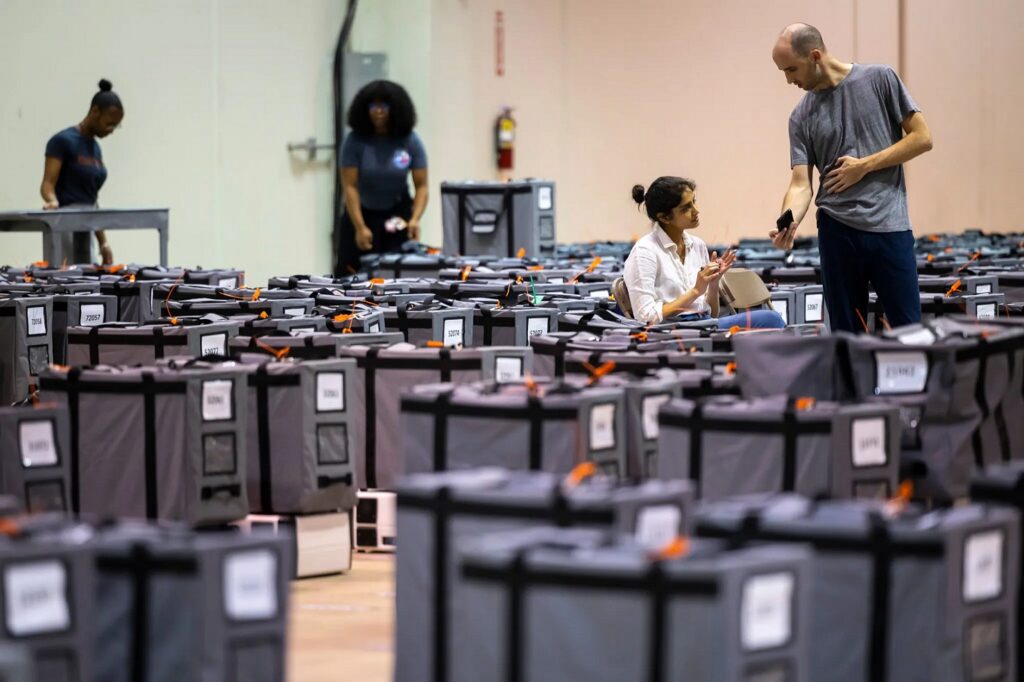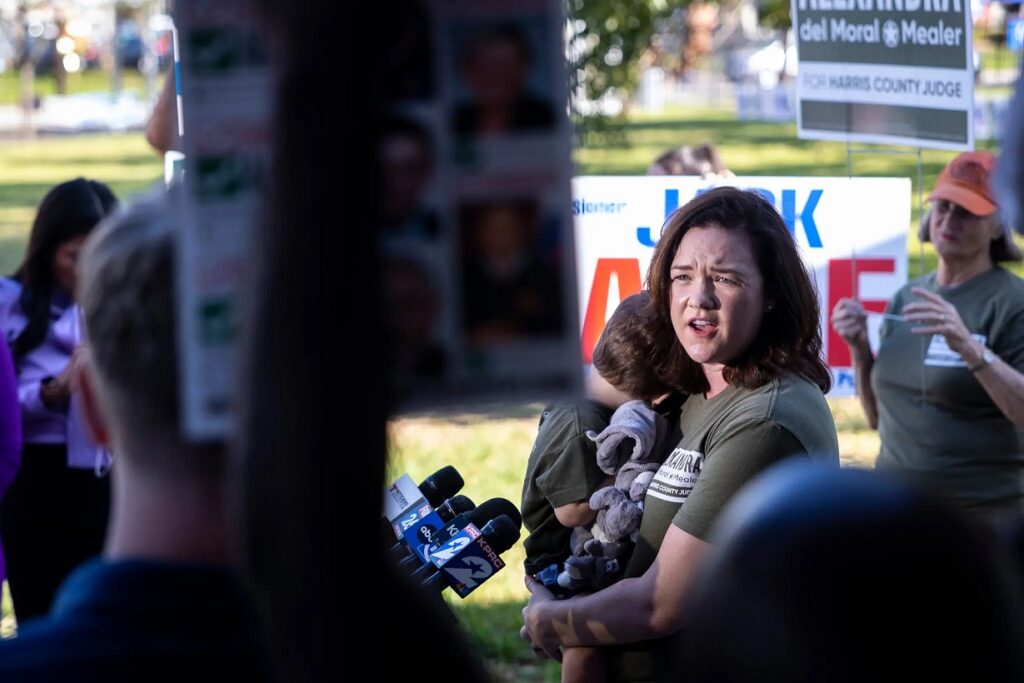Texas Republicans Push New Voting Restrictions Aimed at Houston
By J. David Goodman
On May 10, 2023
The bills propose limits on polling places, tougher penalties for illegal voting and a way for the Republican-led state to order new elections in its largest city.

HOUSTON — Across Harris County, an emerging Democratic stronghold in reliably red Texas, roadside signs posted last November urged harried drivers to vote Republican. A celebrity furniture salesman, beloved by many Houstonians, cut ads with the Republican candidate for the top county administrator’s post.
The 2022 races for local judges and county leaders were among the hardest fought and most expensive yet seen in the sprawling county of 4.8 million, which includes Houston, as Republicans looked to capitalize on crime concerns to make headway in the state’s largest urban area.
But they fell short.
Now, the county is in the cross hairs of the Republican-dominated state Legislature, which is trying to exert more control over voting there. Lawmakers are pushing dozens of new election bills, including limits on polling places, felony penalties for illegal voting and a mechanism for the state to order new elections when voting problems occur in Texas counties with more than 2.7 million people, a category that includes only Harris County.
At the same time, more than a dozen election challenges have been filed by losing Republican candidates in the county who have argued that significant problems at a limited number of polling places on Election Day, including insufficient supplies of ballot paper, were enough to change the outcomes of races. While local leaders acknowledge issues, evidence has not been presented that they affected the results.
Still, the two-front fight, both in the courts and in the State Capitol, highlighted just how important it is for Republicans to keep Harris County in play and not let it become another strongly blue urban center along the lines of Austin or Dallas. As recently as 2014, the party controlled the county, whose Republican top official was re-elected in a landslide. But it has been moving left ever since.
“I tell people, we could be the reason we lose Texas, just because of our size,” said Cindy Siegel, the chair of the county Republican Party, sitting in her office under a painting of George W. Bush with smoke rising from Lower Manhattan after Sept. 11, 2001.
“We’re the wall,” she added. “And they say, so goes Texas, so goes the country. So Harris County is the battleground.”

The election bills aimed at the county are part of a broad effort by Republican state leaders to increase their control over Texas’ Democratic-run urban areas. They include bills prohibiting local governments from adopting certain local ordinances, including over worker pay or hours, and allowing for the removal of elected local prosecutors who refuse to enforce certain laws, such as those banning abortion. The approach mirrors those in other red states with large blue cities, such as Tennessee and Florida.
Republican lawmakers in Texas passed an overhaul of election rules just two years ago in a bitter fight with Democrats. They returned to the subject this session in large part to address the results in Harris County in November.
The election there provided a contentious backdrop because there were real issues during the vote. Some polling places opened late, while others struggled with enough paper to accommodate the two-sheet ballot printouts needed for the county’s huge list of races. The local district attorney, a Democrat, opened an investigation last year.
“The legislative push is to make sure that this never happens in any county in Texas,” said Senator Paul Bettencourt, a Houston Republican and the sponsor of several of the bills. “I believe the lack of ballot paper is voter suppression.”
But county officials said the election bills do not address the issues that arose in Harris County. Instead, they said, the proposed laws could dampen turnout by limiting voting options and would give a partisan secretary of state, an official appointed by the governor, the power to overturn results and order a new vote if ballot paper issues arose again.
Christian Menefee, the Harris County attorney, said the election challenges appeared to try to lay the groundwork for giving Republicans more control over the elections in a Democratic county. “It is a solution in search of a problem that’s not widespread,” he said.
“As a Black man whose grandfather paid a poll tax, this whole ordeal is infuriating,” said Mr. Menefee, a Democrat. “It’s a complete misuse of the word disenfranchisement from people who, by the way, are still working to disenfranchise folks.”
The scale of the problems on Election Day — which featured new voting machines and a lengthy ballot that required two pages of paper per voter — remains a matter of dispute, both in court and before the Legislature. But they do not appear to have affected the vast majority of the county’s 782 polling locations.

At a hearing before a State House committee in March, the head of the secretary of state’s elections division said that despite logistical problems, the 2022 election “was one of the best elections we’ve seen” in several years in Harris County, though he acknowledged it was a low bar given the roundly criticized primary election earlier in the year.
Republicans have said the November results were indeed affected because, they have argued, the ballot issues arose in precincts where their voters turn out in large numbers. Democratic county officials have said the problems occurred in other areas as well and were limited in scope: A postelection report by the election administrator, Clifford Tatum, found that 68 polling places reported running out of paper on Election Day, and 61 said they later received additional paper.
County officials have resisted releasing documents and other information about the handling of voting issues on Election Day in response to public information requests, citing the ongoing litigation. Among Senator Bettencourt’s election bills is one that would remove the “litigation exception” for requests for certain election records.
With that backdrop, the State Senate has advanced more than a dozen election bills, explicitly or implicitly aimed at Harris County, an area larger than the state of Rhode Island that includes not only the reliably Democratic city of Houston but also some of its more moderate suburbs.
The county since 2016 has shifted ever more firmly into the Democratic column in presidential races and local ones as well, as formerly conservative neighborhoods and growing Houston suburbs have grown more diverse and trended blue. The political make-up of the five-member commissioners court, which administers the county, has gone from a three-two Republican majority in 2014 to a four-one Democratic majority now.
Republicans are hoping, if not to reverse that trend, then at least to keep the contests close and, sometimes, winnable.
“The Texas Legislature will ensure that there are consequences for Harris County’s failure to run elections,” said Senator Mayes Middleton, a Houston-area Republican and the sponsor of the bill to allow the secretary of state to order new elections in certain cases of ballot paper problems. “Disenfranchising voters is unacceptable,” Mr. Middleton said, in a statement.
The county since 2016 has shifted ever more firmly into the Democratic column in presidential races and local ones as well, as formerly conservative neighborhoods and growing Houston suburbs have grown more diverse and trended blue. The political make-up of the five-member commissioners court, which administers the county, has gone from a three-two Republican majority in 2014 to a four-one Democratic majority now.
Republicans are hoping, if not to reverse that trend, then at least to keep the contests close and, sometimes, winnable.
“The Texas Legislature will ensure that there are consequences for Harris County’s failure to run elections,” said Senator Mayes Middleton, a Houston-area Republican and the sponsor of the bill to allow the secretary of state to order new elections in certain cases of ballot paper problems. “Disenfranchising voters is unacceptable,” Mr. Middleton said, in a statement.
Also of concern to Democrats and advocates of expanding access to the polls is another bill, which passed the State Senate last month, that would limit voters to their assigned polling place. Some counties, including Harris County, currently allow voters to cast a ballot anywhere in the county.
“It’s definitely one of the most damaging,” said Katya Ehresman, the voting rights program manager at the advocacy group Common Cause Texas, because by limiting voters’ options it could decrease turnout. The bill, like others that have made it through the Senate, must still pass the more moderate, Republican-controlled State House.
In the last election, voters whose polling places ran out of paper were able to go to another location in the county, though some gave up without voting.

Many of the legal challenges to the November election in Harris County involve voters who were unable to cast ballots.
Leila Perrin said she had gone to vote in a more conservative section of West Houston shortly before the polls closed on Election Day and encountered a chaotic scene. “I went to get out of my car, and these people were leaving and they said, ‘Don’t bother,’” she recalled. “I said ‘Why?’ And they said, ‘They don’t have any paper ballots.’”
Ms. Perrin, 72, had planned to vote against the top county official, the Democratic county judge Lina Hidalgo. So she drove to another polling site nearby and found the same situation. By then it was 10 minutes before the polls closed. “So I just went home. I was furious,” she said.
Twenty-one Republican candidates have filed election challenges including Ms. Perrin’s favored candidate, Alexandra del Moral Mealer, who lost to Ms. Hidalgo by 18,000 votes. The first trial is set to begin in June.
Some voters also found themselves unable to vote in predominantly Democratic precincts temporarily on Election Day, though no Democratic candidates have filed challenges. For example, voters were turned away from one such location that did not open for hours. All polls in the county were ordered to stay open an extra hour under an emergency court order, but then voting was halted by the Texas Supreme Court after an appeal from the Republican attorney general.
“Issues don’t mean conspiracies,” said Representative John Bucy, a Democratic member of the Texas House elections committee. “Our elections are run effectively in the state of Texas. Nothing is perfect, but they’re effective.”
At a hearing of the elections committee last month, an election judge in Harris County said he had run out of paper by 6 p.m. on Election Day despite flagging the issue several times during the day.
“We had about 40 people in line, most of whom left to find another polling place,” said the judge, Christopher Russo. Those who stayed would be able to vote, he said he told them, but he could not guarantee how long it would take to get the paper.
“I finally received ballot paper at 9:05 p.m.,” he said. By that time, only four people remained in line.
This piece was republished from The New York Times.